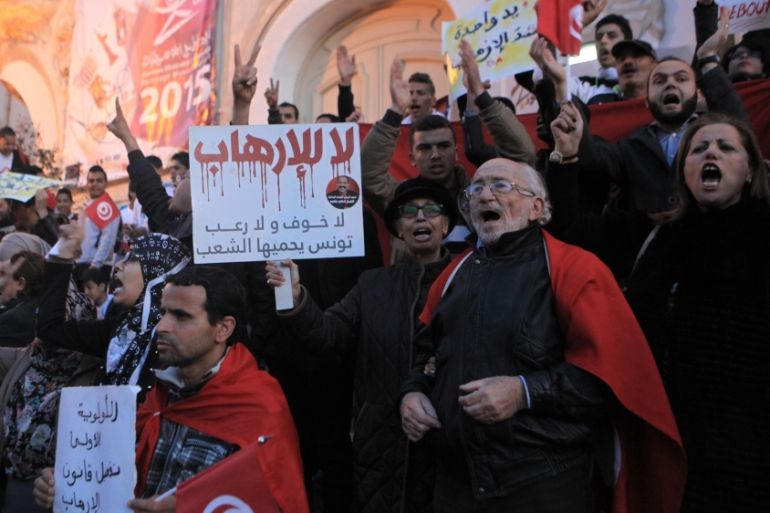Tunisia museum attack will worsen economic woes
Tunisians fear consequences of the museum attack on the economy and democratic transition.

Tunis – As Tunisian authorities step up the hunt for three suspects linked to the attack on the national museum on Wednesday, security analysts say the incident is a blow to the country’s political transiton process and an already deteriorating economy.
The latest death toll, according to Tunisian health ministry figures, puts the number at 19 people killed, including 17 foriegn tourists and the two assailants. Over 40 others were injured, some seriously, in a hostage situation inside the museum that lasted for more than three hours.
On Thursday, Tunisian daily al-Chorouq said the attackers were identified and both were Tunisians. Recently, the family of one of the attackers reported to authorities that he called from Iraq a few months after he disappeared.
The assault on the museum is the first to involve a high number of civilian causalities since a 2002 bomb attack, carried out by an al-Qaeda offshoot, targeted tourists at a Jewish synagogue on the Island of Djerba.
Although no group has claimed responsibility for the attack, so far, politicians and security analysts say the attack was a long time coming.
“The extremist groups, especially those inspired by ISIL, have been saying they were going to do something like this, and now they have,” said Youssef Cherif, a Tunisian political analyst.
He added that the attack “was clearly an assault on Tunisia’s political transition and economy” and is connected to regional instability.
“These groups do not accept the fact that there will be a democracy in this country.”
RELATED: Sousse: Seaside home of ‘Jihadist’ volunteers
The attack also raised concerns that ISIL-linked groups might be operating in the country.
It's a message that the democratic transition is not immune from threats. We know what the consequences of tourists being killed is… This is so bad for the economy
In 2013, Tunisian authorities announced that two groups, which the Tunisian army has been hunting on the Algerian border, have links to al-Qaeda. Last September, the group called Oqba ibn Nafaa brigade issued statements in support of ISIL.
More importantly, however, there has been a steady flow of Tunisian recruits to ISIL.
One study found out that Tunisia provides the largest number of foreign fighters in Syria and Iraq with numbers ranging between 1,500-3,000 fighters.
While several analysts were quick to link the national museum attack to ISIL-inspired groups, however, according to Moncef Kartas, a researcher with the Geneva Institute, this remains speculative. What is clear, he points out, is that the museum attack hit Tunisia where it hurts the most.
“The two biggest challenges were security and the economy, and this is basically a tragedy for both sectors,” Kartas said.
Other analysts viewed the attack as an assault on the country’s nascent democratic transition process.
“It’s a message that the democratic transition is not immune from threats,” said Issam Matoussi, an MP from Nidaa Tunis, the country’s ruling party. “We know what the consequences of tourists being killed is… This is so bad for the economy,” he told Al Jazeera.
In 2010, the tourism industry, one of the most vital sectors for national economy, made up 7 percent of the national GDP and accounted for more than 20 percent of Tunisia’s revenues in foreign currency. It has employed 400.000 people.
An anti-terrorism draft law is expected to be ratified by the Tunisian cabinet and will then be submitted to the parliament for a vote session in the coming weeks.
The museum attack, according to Cherif, will accelerate such a process and is more likely to tilt the balance in favour of those advocating for security over human rights and democracy.
Several analysts agree that regional instability has played a crucial role in facilitating the movement of armed
|
|
groups into the country.
“The changes we are witnessing have made all the region vulnerable to armed violence,” Kartas said.
Tunisia is facing threats from its eastern border with Libya, which is experiencing a chaotic state of armed conflict between various militias, and also from the northwest border area with Algeria, where most of the militant attacks in Tunisia have happened to date.
“The security forces are really over stretched and strained because they have to secure many fronts,” Kartas explained, adding that this makes it difficult to develop a proactive strategy as opposed to handling threats as they emerge.
The attack, however, does not mean that Tunisian security forces have entirely failed.
“Security services have to get lucky 100 percent of the time and terrorists only have to get lucky once,” Herbert said.
Despite the attack, the security situation in Tunisia is likely to remain the same according to Herbert.
“The same threats, and the same likelihood of threat, which existed yesterday will exist tomorrow,” he said.
“What has changed, however, is how Tunisians and foreigners perceive the threat. The issues of perception is more difficult to deal with, and, in the short term, is likely to lead many to view the terrorist risk in Tunisia as worse than it actually is.”
Follow Eric Reidy on Twitter: @eric_reidy